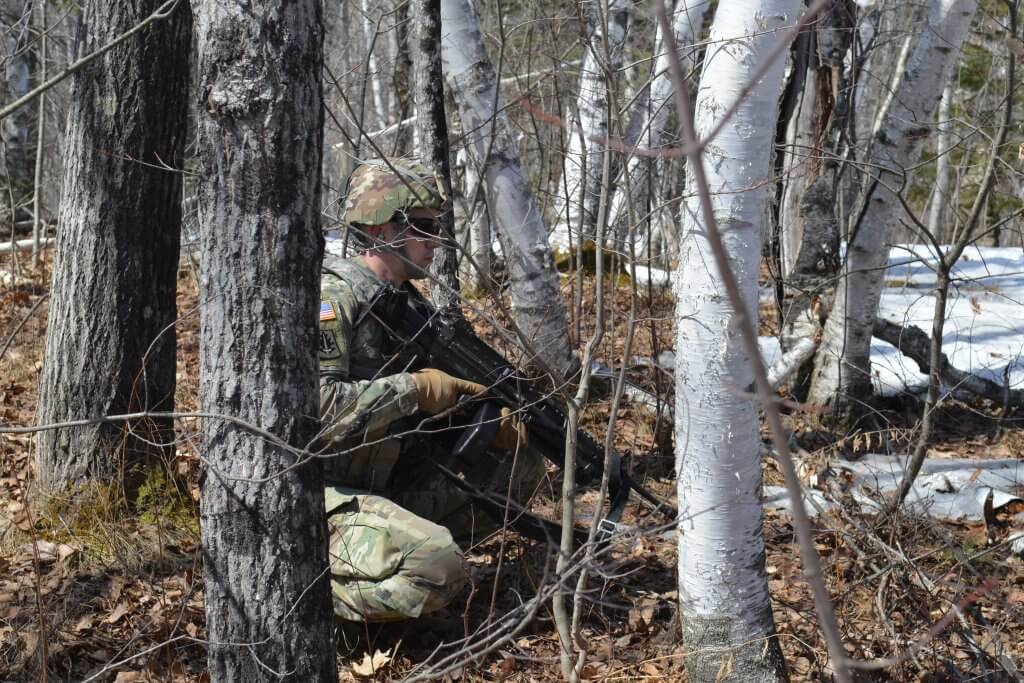Dozens of Bangor-based soldiers deployed to Poland last month in support of Operation Atlantic Resolve.
The 286th Combat Sustainment Support Battalion prepared for nearly 20 months ahead of the deployment, including joint exercises with the preceding battalion. Atlantic Resolve’s intent is to build readiness, increase interoperability and enhance bonds between ally and partner militaries with multinational training events in Bulgaria, Estonia, Hungary, Latvia, Lithuania, Poland and Romania, according to a press release from the Maine National Guard.
Sixty-nine soldiers joined roughly 6,000 personnel attached to Atlantic Resolve. The battalion is supporting ground troops in an area of operation spanning the distance from Maine to Florida, Command Sgt. Maj. Karri Bennett says. She recently marked 30 years with the Maine Army National Guard.
Lt. Col. John Wilmot, commanding officer, says every billet is part of the deployment.
“Really all of our billets are going forward, which include the full complement of battalion-level staff, officers and senior NCOs in those staff positions, as well as the support company which would include some folks running our supply, some mechanics and cooks in the maintenance section,” Wilmot said. “As far as what they are going to be doing, this particular battalion staff will have three active duty companies that fall underneath us and two platoon-plus size detachments from the Army Reserve. Our primary job is going to be providing logistics support to all of the ground-based major exercises in Eastern Europe.”
Wilmot, who is prior enlisted, joined the 286thin 2008. Part of the unit’s preparation was to ensure “the right people” were slated for the deployment.
“ … those people that have a great deal of flexibility, high level of intelligence and most importantly, can work in a team environment,” he said.
U.S. Army Europe has led the Department of Defense’s Atlantic Resolve since 2014. Rotations occur every nine months. Leadership teams work on readiness during all stages of the deployment once the next rotational unit is identified. For example, the 286thcommunicated with its predecessor for close to a year, conducting teleconference calls and information sharing on expectations.
“The unit that’s replacing us has also been identified already, so we’ve already established our relationship with them as well so as we learn things, we’re passing that onto them. We’ve already established timelines where some of our team members will leave and come back to the rear to work with them,” Bennett said.
Interpersonal relationship building is a key part of establishing cohesion between U.S. and European forces, with soldiers learning basic phrases of the Polish language.
“These U.S. troops are making an honest, heartfelt attempt to really speak their language. The other thing that we’ve done as it relates to that is each one of our locations, the host nation has established a liaison center that really becomes embedded in the office,” Wilmot said.
On a personal note, the CO sees the opportunity of being in Eastern Europe as a “pretty powerful” one. During his high school years, Wilmot’s family hosted a German exchange student who shared with him a piece of the Berlin wall. He says he is looking forward to the experience on a personal level.
“Seeing a part of the world that was closed off during the Cold War — there is no other profession that provides this opportunity to travel, work around the world. I’m going to learn a lot and get to support these Eastern European countries as they continue to establish themselves,” he added.

